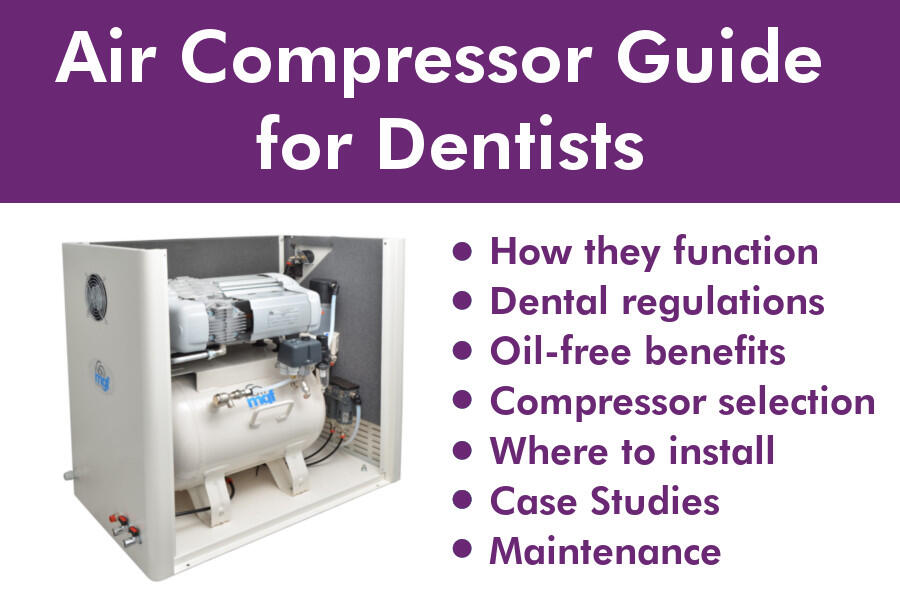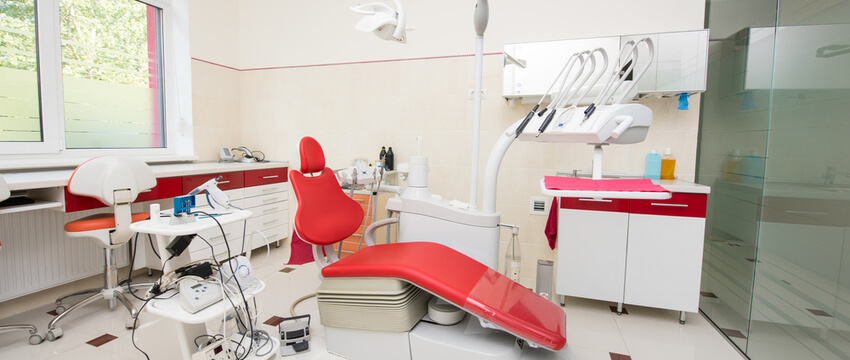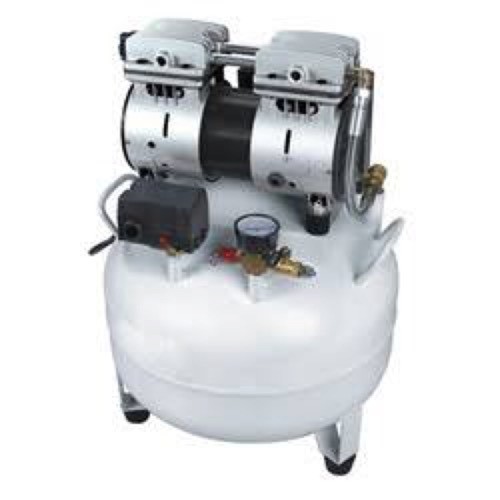A compressor for a dental clinic is essential for powering pneumatic dental tools efficiently. It ensures a reliable and quiet operation that is vital for a comfortable patient experience.
Selecting the right compressor for a dental practice hinges on factors like power, noise level, and air quality. Dental compressors differ from standard industrial units in that they provide clean, dry air to prevent contamination. A typical compressor used in dental settings features a compact design, oil-free operation, and adequate cubic feet per minute (CFM) output to meet the clinic’s demand.
Additionally, its maintenance requirements and longevity are important considerations, as they directly impact the clinic’s operational costs. Modern dental compressors also boast features to minimize the risk of airborne pathogens, ensuring a sterile environment conforming to health and safety regulations. Choosing a dependable dental compressor contributes to the smooth function of dental instruments and optimal patient care.

Credit: eclipse-dental.com
Introduction To Dental Clinic Compressors
Imagine visiting a dentist where the tools aren’t ready for use. That’s where compressors come in. These machines are a cornerstone of modern dental clinics. They power various tools that dentists use every day. From cleaning teeth to filling cavities, compressors are key. In this section, expand your knowledge on dental clinic compressors.
The Role Of Compressors In Dental Clinics
Compressors in dental clinics are like the heart in the human body. They pump vital air to dental tools. Without this air, the tools cannot work. Compressors also clean the air. They remove water and impurities. This means the air is safe. It keeps patients’ mouths clean and free from infection.
Types Of Compressors Used In Dentistry
In dentistry, two main types of compressors are vital. The first is the oil-free compressor. It avoids oil in the air. This oil can harm dental work. The second type is the lubricated compressor. It uses oil for smooth operation. But, it needs more filtration. This stops oil from reaching dental tools.
- Oil-Free Compressors: Clean air, no oil, best for patient health.
- Lubricated Compressors: Smooth, but need extra filters.

Credit: www.cattanicompressors.com.au
Key Features Of A Dental Compressor
Key Features of a Dental Compressor are essential to consider for a dental practice. An efficient dental compressor provides the power behind your clinic’s handpieces and other equipment. Its features impact the performance, durability, and safety of dental procedures.
Oil-free Vs. Lubricated Compressors
Oil-free compressors offer clean air quality critical for dental operations. They require less maintenance and are environment-friendly.
Lubricated compressors may cost less but need regular oil changes. They could introduce oil vapors into the compressed air, possibly affecting patient health.
Noise Level Considerations
The noise level of a compressor is measured in decibels (dB). A quiet compressor improves the patient experience. Look for models with a low noise level, typically below 70dB.
Dental Compressor Maintenance Requirements
Regular maintenance ensures longevity and reliability. Necessary tasks include air filter replacement and moisture drain. Here’s a basic maintenance checklist:
- Daily: Check for unusual noises and drain moisture
- Weekly: Inspect hoses and connections
- Monthly: Clean or replace air filters
- Annually: Have a professional service
Following a structured maintenance schedule prevents unexpected breakdowns.
Selecting The Right Compressor
Choosing the right compressor for a dental clinic plays a critical role in everyday operations. Dentists rely on efficient, high-quality air compressors to power equipment that is fundamental to patient care. Ensuring that you select the appropriate compressor involves understanding specific requirements. These include size and capacity, pressure and flow demands, and how clinic size affects your choice.
Understanding The Size And Capacity Needs
Dental compressors come in various sizes and capacities. To determine the ideal size, consider the number of dental chairs in your clinic. Each chair typically requires around 50 liters per minute (L/min) at 5-7 bar pressure for optimal operation.
- Single-chair clinics: Might opt for a smaller, compact unit
- Multiple-chair clinics: Require larger tanks to ensure a steady supply
Evaluating The Pressure And Flow Requirements
Compressor performance is defined by its pressure and flow. Dental tools need consistent and reliable air flow.
| Tool Requirement | Flow (L/min) | Pressure (bar) |
|---|---|---|
| Handpieces | 40-60 | 6-8 |
| Scalers | 30-40 | 5-7 |
| Suction Units | 300-500 | 5-7 |
Study your tools’ specifications to match them with a compressor that meets these metrics.
The Impact Of Clinic Size On Compressor Choice
The overall clinic size fundamentally impacts the kind of compressor you need.
- Small clinics might need a single-user compressor.
- Larger facilities benefit from a centralized system.
Central compressors provide an uninterrupted service to all dental stations. They are also more power-efficient for larger practices.
Dry Air Systems In Dental Compressors
When we consider high standards in dental clinics, air quality takes center stage. Dry Air Systems in Dental Compressors play a pivotal role. They ensure that the air dentists use is clean and dry. This is crucial for both patient health and the longevity of dental tools.
The Importance Of Air Quality In Dental Procedures
Compressed air quality is vital in dental care. Moisture in dental tools can cause infections. Dentists must use dry, sterile air. Dry air compressors remove moisture from the air. This keeps both patients and dental instruments safe from contaminants.
- Prevents Microbial Growth: Dry air reduces the risk of bacteria.
- Protects Dental Instruments: Moisture can damage tools. Dry air helps maintain equipment.
- Ensures Accurate Results: Moisture can affect filling materials. Dry environments are essential.
Drying Technologies In Compressors
Modern compressors use advanced drying technologies. Desiccant dryers and refrigerated dryers are common.
| Technology Type | Function |
|---|---|
| Desiccant Dryers | Use materials to absorb water from air. |
| Refrigerated Dryers | Cool air to remove moisture through condensation. |
Integrating advanced drying technologies in compressors enhances dental practice efficiency. Dentists can rely on the constant supply of dry air. This ensures optimal conditions during dental procedures.
Installation And Setup Of Dental Compressors
The success of a dental clinic hinges on its equipment, including the dental compressor. Proper installation and setup are crucial for ensuring longevity and performance. Let’s dive into how to prepare for the installation and the debate between hiring a professional or doing it yourself.
Site Preparation For Compressor Installation
Preparing your site for a compressor is a key first step. Here’s how to get started:
- Select a well-ventilated area to avoid overheating.
- Ensure the space is dry to prevent rust and corrosion.
- Check that the floor is level to minimize vibration.
- Keep enough clearance around the compressor for maintenance.
- Verify electrical supply matches the compressor’s requirements.
Professional Installation Vs. Diy
Choosing between a professional installation and a DIY approach can impact safety and efficiency.
| Professional Installation | DIY Installation |
|---|---|
| Expertise ensures correct setup | May be more cost-effective |
| Time-saving with experienced handlers | Requires time and effort to learn |
| Possibility of service warranty | Risks of potential errors |
| Safety standards are prioritized | Varying safety assurance |
Assess the skills and tools you have against the complexity of installation. When in doubt, choose professional installation to secure performance and longevity.

Credit: www.linkedin.com
Maintenance And Troubleshooting
Keeping a dental clinic’s compressor in tip-top shape is vital. It avoids downtime and ensures clean, dry air for treatments. A well-maintained compressor is less likely to fail when you most need it. Understand the maintenance routine and how to troubleshoot common issues to keep your compressor reliable.
Routine Maintenance Schedule
- Check air filters monthly for blockages or buildup and replace as needed.
- Drain the water tank weekly to remove moisture and prevent rust.
- Lubricate moving parts every six months for smooth operation.
- Assess hoses and connections for wear or leaks every quarter.
Logging each maintenance action helps track the compressor’s health.
Common Issues And Solutions
| Issue | Solution |
|---|---|
| Excessive noise | Check for loose parts and tighten them. |
| Motor won’t start | Reset the overload switch; check power supply. |
| Low air pressure | Inspect filters and replace if clogged. |
| Oil in the air lines | Replace oil separator and check for leaks. |
When To Call A Professional Service Technician
- If noise or vibration is still high after tightening parts.
- When motor issues persist despite troubleshooting.
- If oil or moisture contamination continues after filter changes.
Contact a technician for an inspection every year or after any major issues.
Health And Safety Standards
Maintaining health and safety standards in dental clinics is crucial. Dentists use various tools that require clean air to function. A compressor is one key device in this setup. Let’s discuss how these machines meet health regulations and ensure a sterile air supply. Keeping patients and staff safe is a priority.
Compliance With Health Regulations
A dental compressor must follow strict health guidelines. Compressors should be designed to avoid air contamination. This means they must be oil-free and equipped with proper filtration systems. It’s not only about performance. It is about safety too.
- Certifications: Look for devices with ADA and OSHA approval.
- Regular maintenance: This ensures that the machine functions within the required standards.
- Documentation: Keep clear records of all safety inspections and servicing.
Ensuring Sterile Air Supply
The air that powers dental tools must be free of contaminants. A sterile air supply reduces infection risks. This is vital for both patient health and the longevity of dental instruments.
| Feature | Benefit |
|---|---|
| HEPA Filters | Remove 99.97% of particles from the air. |
| Dryer Units | Prevent moisture, which can breed bacteria. |
| Regular Testing | Checks for any microbial growth in the air. |
To summarize, a dental clinic needs a high-quality compressor for safe care. This compressor must follow health standards strictly. It must also provide clean, sterile air. Patients expect and deserve the best care with the safest equipment.
Cost-benefit Analysis
An essential decision for your dental clinic involves evaluating a compressor’s costs and benefits. Such an analysis highlights the balance between upfront payments and ongoing expenses. Importantly, it pinpoints where savings are possible. Let’s dive into the factors influencing the cost-effectiveness of a dental clinic compressor.
Initial Investment Vs. Operational Costs
Choosing a compressor entails upfront costs and future expenses. The initial investment includes the purchase price and installation. Operational costs cover maintenance, repairs, and energy consumption. Careful consideration of both helps determine the total cost of ownership.
| Item | Initial Costs | Operational Costs |
|---|---|---|
| Purchase | $2000-$5000 | Varies Over Time |
| Installation | $500-$1000 | |
| Set-Up | <$500 |
Long-term savings may outweigh the initial investment. Choosing an efficient, reliable model pays off over time. Quality compressors mean fewer repairs and lower operational costs.
Cost Savings Through Energy Efficiency
Modern compressors offer energy savings. They use less power and work more effectively. Technologies like variable speed drives adjust energy usage to the demand. This means big savings on utility bills.
- Energy-efficient models save up to 35% on power.
- Variable speed compressors match output to need, preventing waste.
- Regular maintenance extends lifespan, offering more value for money.
Dentists can recover the higher initial cost of an energy-efficient model through these savings. Energy Star ratings guide purchasers to the most efficient options.
Technological Innovations
In the rapidly advancing world of dental care, technology plays a pivotal role. Particularly, compressors stand as the backbone of dental procedures. Modern innovations ensure that these machines are becoming more efficient, reliable, and integral to the dental practice than ever before.
The Future Of Compressors In Dental Clinics
The next generation of dental compressors brings about a transformative experience. They enhance not just the performance but also the sustainability and smart monitoring capabilities. Let’s take a brief look at these improvements:
- Energy-efficient designs that reduce overhead costs
- Advanced noise-reduction technologies for a comfortable environment
- Smart systems that alert for maintenance needs
- Predictive analytics for extended lifespan and reduced downtime
Integration With Digital Dentistry
Compressors are stepping into the digital age. Integration with digital tools optimizes operations within dental clinics. The following points illustrate how this merge benefits practitioners:
| Integration Feature | Benefit |
|---|---|
| Automated Control Systems | Ensures consistent pressure and flow |
| Remote Monitoring | Offers convenience and proactive maintenance |
| Data Synchronization | Streamlines workflow and patient management |
These advancements in compressor technology undoubtedly mark a significant leap forward. Dental health professionals must stay abreast of these changes. Doing so ensures they offer the best care while maintaining an edge in a competitive field.
Conclusion
Selecting the right compressor is vital for any dental clinic’s operational success. It ensures a sterile, quiet, and efficient environment for patient care. As we’ve explored, reliability and quality are non-negotiable features. Embrace the investment in a top-notch dental compressor — your practice’s heartbeat depends on it.

